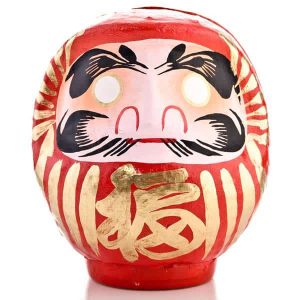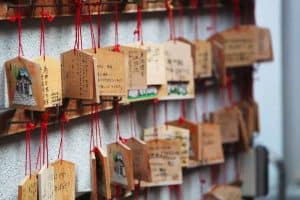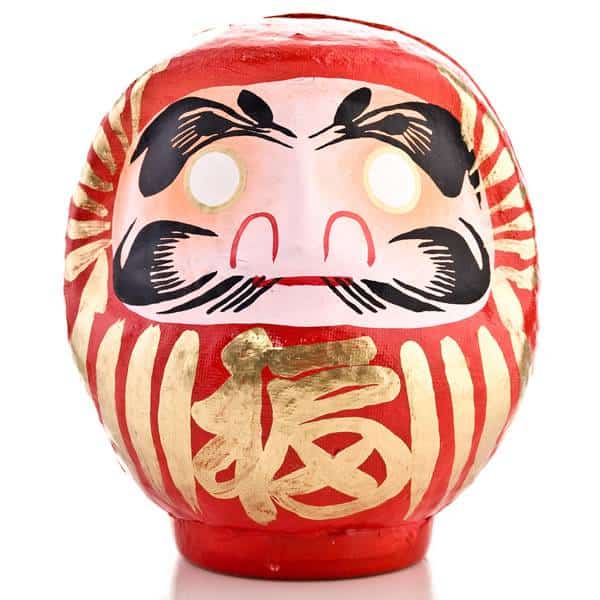In Japanese tradition there is a lot of superstition whether they are good or bad. There are lucky animals, unlucky numbers and long list of Japanese folk wisdom which is used throughout their culture. Whether you choose to believe that things happen for a reason or not, these Japanese Good Luck Charms are sure to change your mind on the matter.
Traditional Japanese Good Luck Charms
- Cats
The most well-known of all Japanese good luck charms has got to be the
Lucky Cat. The Lucky Cat has been engraved in the Japanese culture since the Meiji-era. There are many variations to the Lucky Cat tale but the main gist of it is that a poor priests cat saves a rich lords life by beckoning to him with her paw, the lord thanks the man buy giving him the money to build a shrine and from this the Lucky Cat was born. Also known as Maneki Neko to many, the beckoning cat is thought to bring good fortune and is often used in the entrance to businesses.

- Daruma
Daruma or Dharma are hollow, round Japanese lucky dolls. The dolls are weighted at the bottom to avoid them falling over, this stability is seen as a symbolic representation of the persistence of meditation by the Buddha. Daruma are traditionally sold with no eyes, which initially may leave you feeling a bit concerned that you’ve been scammed but there’s actually a clever reason for this. You are supposed to fill in one eye with a black marker when you set a goal and then fill in the other eye when you’ve completed your goal!

- Wooden Wish Boards
Wooden Wish Boards also known as Ema are prayers boards which you buy at Japanese shrines. These traditional Japanese good luck charms are filled out with prayers and wishes of each person and left hanging at the shrine. This is very popular among the Japanese people and tourists, so much so that the Ema are often collected and burnt to make space for new Ema to be hung.

- Spiders in the Morning
Spiders and good luck don’t really go in hand on this side of the globe but the Japanese tend to see spiders in a different light. According to Japanese superstition if you see a spider in the morning its good luck and you shouldn’t kill it. If you see one at night then its seen as bad luck and you are allowed to kill it. Spiders are mentioned throughout Japanese myths and are quite respected creatures. Its believed that if a spider live to 400 years of age it gains super powers such as the ability to shapeshift into human form.
- Koinobori
The Koinobori are carp shaped streamers and are put up each year for Children’s Day in April. Despite just looking beautiful, its thought that Koinobori are a symbol for bringing health to children. Each spring, millions of Koinbori are put up outside homes and besides the river. The tradition for Koinbori originally comes from the Chinese legend about the journey of the carp who swims upstream to become a dragon.

- Black Eggs
Black eggs may not seem like the most appetising dish but eating these eggs is thought to extend your lifespan! Eating one egg is said to add 7 years to your life, two eggs will add 14 years and three eggs is not advised as you may get a little ill. For an extra 14 years on your lifespan, we can see why this tradition is so popular amongst visitors. Known as Kurotamago in Japanese, these eggs are cooked in the Owakudani volcanic valley in Hakone so if you’re in the area, it may be worth a visit!
- Kit Kat
Kit Kats may just been seen as a snack in our packed lunchbox but in the Japanese tradition kit kats are a lucky charm. Available in over 400 flavours in Japan, the chocolate bar is often gifted to students at exam time. The term Kit Kat has become a popular abbreviation for the term ‘kitto katsu’ meaning ‘a sure win’. The recognisable red wrapper has also improved its lucky status as red is seen as being a very lucky colour amongst the Japanese.
- The Seven Lucky Gods
The Seven Lucky Gods are a group of deities who travel together on a treasure boat to visit Japanese cities at New Years. You’ll notice that the seven gds often appear in Japanese artwork and each god is thought to bring their own unique luck. Grouped together the seven lucky gods are known to bring happiness, love, wealth, luck, wisdom and longevity.
- Tori No Ichi
Tori No Ichi is a market held in November which sells decorated bamboo rakes. Translated as Rooster Rake Fair, the fairs are held throughout the days of the rooster in November and can take place 2 to 3 times that month depending on the year. Tori No Ichi is extremely popular as there are as many as 30 in Tokyo alone. The bamboo rakes are decorated in a range of Japanese lucky charms which are thought to bring luck to your business including gold coins and
Maneki Neko.
- The First Dream of the New Year
So the 1
st of January was a couple of months ago now so we doubt you’ll be able to remember what your first dream of the year was and neither can we! But according to Japanese tradition the first dream of the New Year also known as Hatsuyume is considered to be an omen for the year. The luckiest things to dream about include Mount Fuji, a hawk or an aubergine!

If you’re feeling like you’re in need of some good luck then have a look at our range of
Japanese Good Luck Charms including
Maneki Neko,
Daruma and
The Seven Lucky Gods. If you liked this post and would like to read more like this then feel free to follow The Japanese Shop on
Facebook and
Twitter for regular blog posts on
Japanese Culture and Tradition.




 If you’re feeling like you’re in need of some good luck then have a look at our range of Japanese Good Luck Charms including Maneki Neko, Daruma and The Seven Lucky Gods. If you liked this post and would like to read more like this then feel free to follow The Japanese Shop on Facebook and Twitter for regular blog posts on Japanese Culture and Tradition.
If you’re feeling like you’re in need of some good luck then have a look at our range of Japanese Good Luck Charms including Maneki Neko, Daruma and The Seven Lucky Gods. If you liked this post and would like to read more like this then feel free to follow The Japanese Shop on Facebook and Twitter for regular blog posts on Japanese Culture and Tradition.

